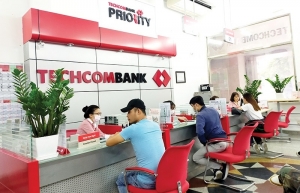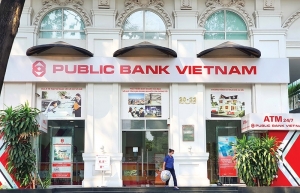Localisation favoured by overseas banks
 |
| Localisation favoured by overseas banks, Photo Shinhan Bank Vietnam |
Shinhan Bank last week expanded its footprint in Vietnam by opening three new branches in the country’s two most populous cities, solidifying its position as the largest foreign lender currently active in the Southeast Asian nation.
The bank said it has established a new branch in Hanoi, in addition to two branches in Ho Chi Minh City. This brings the total number of the bank’s offices in Vietnam to 46.
“The new branches help us to maintain the largest sales network in Vietnam among all foreign banks operating there,” the bank said. “We expect that such a network will build a friendlier brand image across Vietnam, and in that regard, we will strive to offer better services.”
In May, Shinhan Financial Group announced an agreement, worth roughly $90 million, to acquire a 10 per cent stake in Vietnam’s e-commerce platform Tiki. Its two units, Shinhan Bank and Shinhan Card, purchased 7.44 and 2.56 per cent interests in Tiki, respectively.
“Based on Shinhan’s financial expertise and Tiki’s database in a broad range of areas, we are expecting to build a new converged digital ecosystem in Vietnam,” a Shinhan representative highlighted.
Meanwhile, Thailand’s Kasikornbank (KBank) is moving forward with aspirations to become a regional digital bank, with a focus on Vietnam’s growth. Thailand’s largest financial institution last week announced its commitment to broaden its presence in the Vietnamese market in order to serve customers across all segments with digital services.
With the goal of investing approximately $75 million, KBank plans to strengthen its service network within ASEAN, Japan, China, and South Korea. By 2023, the bank plans to lend $560 million to the Vietnamese market and have 1.2 million retail customers here.
Kattiya Indaravijaya, KBank CEO, highlighted that the post-pandemic outlook for the ASEAN economy is optimistic.
“In addition to that, ASEAN is renowned for its expansive market with an increasing proportion of young people - the primary engine of its economic growth. Moreover, the bloc’s economy is set to see exponential growth as more and more consumers lead a digital life,” Indaravijaya said.
KBank president Pipit Aneaknithi also revealed that the Thai lender aims to be the first foreign bank in Vietnam to offer fully-fledged digital solutions to all customer segments.
Woori Bank Vietnam – another wholly-owned South Korean lender operating in Vietnam – has inked an MoU with Seoul Guarantee Insurance Company (SGI) to jointly develop and launch new credit products in the country. Woori Bank said it would actively localise its business by building advanced credit solutions including loan application and loan approval. A favourable synergy between the two parties is expected as a result of this collaboration. SGI also expects this synergy would foster its underwriting business.
“To achieve the goal of being the top digital and retail bank, Woori is laser-focused on the retail business based on digital platforms. The bank continues to significantly overcome the limitations of foreign banks and compete with leading domestic banks in Vietnam,” Woori Bank noted.
Bank of America – the second-largest in the United States – submitted an application last month to open a branch in Ho Chi Minh City with capital of around $50 million.
The bank’s executive vice chair of Global, Corporate, and Investment Banking Madhu Kannan noted that it presently boasts 450 of the most successful investors in the globe.
“To develop an advanced, world-class financial market, infrastructure and policy alignments are significant factors in luring financial and IT professionals to the city,” Kannan emphasised. “As Ho Chi Minh City aspires to be the next regional and global financial hub, we would adopt our expertise to support the city in this regard.”
Founded in 1904, Bank of America had a representative office in Ho Chi Minh City until 2002 when the parent bank in the US liquidated it as part of a systemic restructuring.
In the same vein, Korean Development Bank (KDB), a wholly-owned policy development bank in South Korea, earlier this year also confirmed its intention to open a branch in Hanoi. According to its announcement, it will assist South Korean and Vietnamese enterprises in the infrastructure sector when it opens an office in Vietnam.
Meanwhile, BIDV Securities Company (BSC) and Hana Securities Company (HSC), a member of Hana Financial Group, have entered strategic cooperation. “HSC will proactively assist BSC in formulating a strategic plan and long-term vision, particularly specialising in digital transformation and establishing a fund management company,” the firm said.
In last week’s meeting with Kim Jung Tai, chairman of the Global Strategy Committee at Hana Financial Group, Vietnamese National Assembly Chairman Vuong Dinh Hue stated, “Vietnam will continue to consider expanding investment for foreign groups, including South Korean financial institutions.”
 | Credit institutions asked to tighten loans in “overheating” sectors: SBV The State Bank of Vietnam (SBV) has requested local credit institutions and foreign banks’ restrict lending concentration for real estate and construction, Build-Operate-Transfer (BOT) and the consumption sector. |
 | Foreign banks grab slice of investment promotion action More foreign banks are engaging in the organisation of investment promotion events, facilitating Vietnam to attract more investors to the country. |
 | Loans galore for domestic brokerages Foreseeing the phenomenal expansion of Vietnam’s financial sector, a number of foreign banks, notably those from Taiwan, are escalating their lending offerings and affordable financing sources to some local banks and brokerage firms. |
 | Foreign banks jostle for increased share Earnings of international financial institutions in Vietnam have been inconsistent during the last few years due to focus on longer-term strategies, but some are experiencing a dramatic drop in fortunes. |
What the stars mean:
★ Poor ★ ★ Promising ★★★ Good ★★★★ Very good ★★★★★ Exceptional
Related Contents
Latest News
More News
- Private capital funds as cornerstone of IFC plans (February 20, 2026 | 14:38)
- Priorities for building credibility and momentum within Vietnamese IFCs (February 20, 2026 | 14:29)
- How Hong Kong can bridge critical financial centre gaps (February 20, 2026 | 14:22)
- All global experiences useful for Vietnam’s international financial hub (February 20, 2026 | 14:16)
- Raised ties reaffirm strategic trust (February 20, 2026 | 14:06)
- Sustained growth can translate into income gains (February 19, 2026 | 18:55)
- The vision to maintain a stable monetary policy (February 19, 2026 | 08:50)
- Banking sector faces data governance hurdles in AI transition (February 19, 2026 | 08:00)
- AI leading to shift in banking roles (February 18, 2026 | 19:54)
- Digital banking enters season of transformation (February 16, 2026 | 09:00)

 Tag:
Tag:




















 Mobile Version
Mobile Version